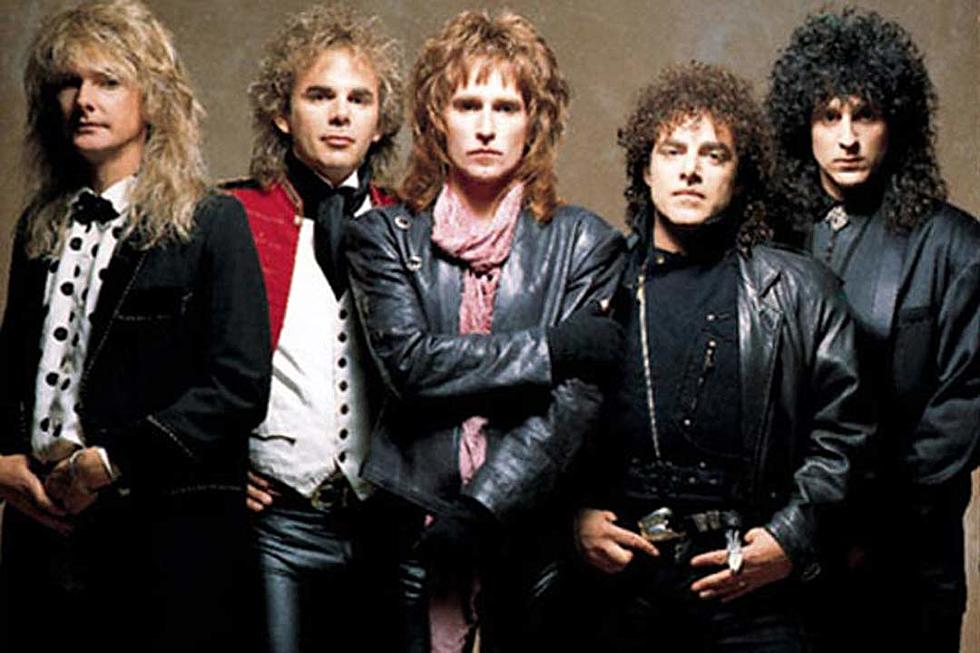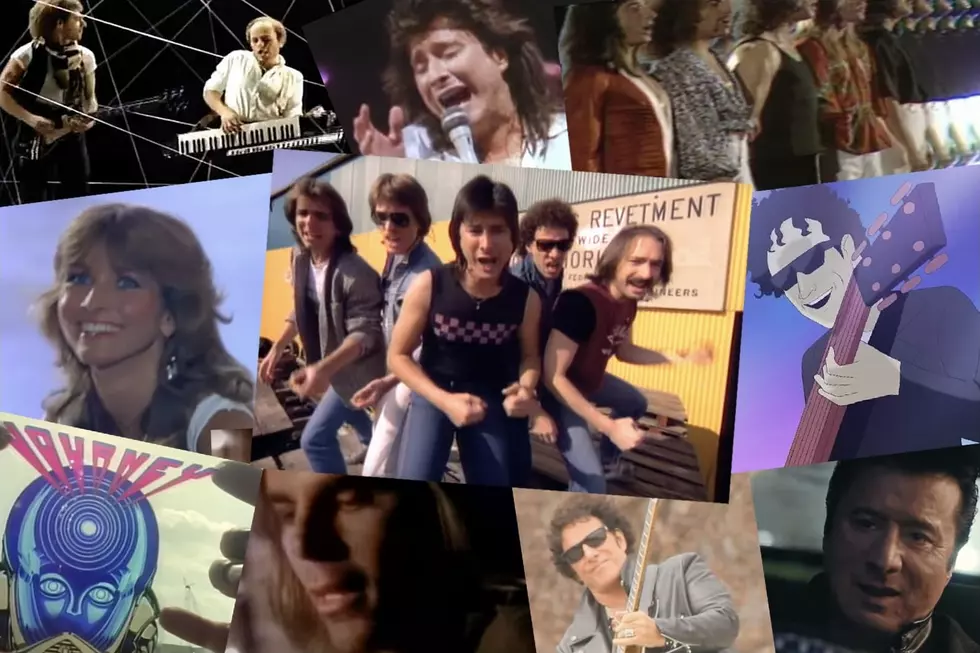
How Journey and Babys Alumni Rose and Fell in Bad English
By the end of the '80s, mainstream rock had acquired enough of a formula sound that detractors had started to accuse the genre's biggest acts of being more like corporations than artists – and when members of those bands started regrouping themselves under different names, they faced critics' cynical jabs about corporate mergers.
Case in point: Bad English, the short-lived supergroup that amalgamated elements of Journey and the Babys into a new, yet decidedly familiar-sounding, platinum blend.
In retrospect, it isn't hard to understand any cynicism that greeted the formation of the band, which rose out of the ashes of Journey's late '80s implosion. Left at loose ends, Journey keyboard player Jonathan Cain hooked back up with his former Babys bandmates, bassist Ricky Phillips and singer John Waite.
Ex-Journey guitarist Neal Schon and future Journey drummer Deen Castronovo were then added to the lineup, and the stage was set for a record that had to have label executives seeing dollar signs. "Nothing's been left to chance," Waite laughed to Kerrang! in 1989. "This record is a motherfucker. I want to see it happen, but whatever does happen now is a bonus."
Waite's decision to resume the band life after starting a successful post-Babys solo career may have caught some fans by surprise, but he insisted it was a decision a long time in the making.
"I wanted to get into a band situation again, I wanted that band thing again. I'd looked for the right musicians for ages, and couldn't get anything, while Jonathan had been talking to my manager, so at the end of the day I thought, 'Why not?'"
Phillips later told Glide Magazine that he and Jonathan Cain "got together and he told me Journey was going to split up, and he was about to announce this to the press and he wanted something ready. 'Do you want to do something? I want to do something like we had when we were in the Babys together.' And I said, 'Yeah, I’m in, let’s do it.'
"We were toying around with who we wanted to be the singer and we were thinking about who to be on guitar, and he ran into John Waite in New York when he was producing a record and he had dinner with John," Phillips said, "and he called me up the next day and said, 'Look, I just had dinner with – we used to call him Bingo – I just had dinner with Bingo and I think the three of us should get together up at my studio in San Francisco; let’s write for a few days and see if we still have the magic.' So we did, and basically we got a record deal, the three of us, with Epic, and then Neal Schon came in."
Watch Bad English's 'When I See You Smile' Video
Unlike Cain, Schon wasn't particularly eager to start another band after Journey's demise, but the songs lured him in. "He had been coming by and putting on solos for us, but he was going to do his own solo record," Phillips recalled. "He said, 'Listen, I’ve been in Journey all these years, and it’s finally time where I can work on my solo career and I’m not sure I want to do this – but boy, this sounds great.'"
They'd been about to enlist guitarist Andy Timmons, but once Schon made himself available, it was no contest. "I think the familiarity and comfort that happens, especially when you’re really, really, putting it all out there – a brand new project which could fail miserably – you want to have all your ducks in line and make it as easy as possible," he explained. "So Neal was the obvious progression, besides the fact that he was a dear friend of all of us."
According to Waite, that comfort level remained high during the songwriting sessions for what would ultimately become the band's self-titled debut record, released June 26, 1989.
"We wrote about 40 songs in six months, but a lot of them weren't very good at all," he recalled. "I kept trying to write stuff that would blow the roof off. It was a little like walking on thin ice, we didn't want it sounding too much like one thing or another, Journey or John Waite, and I think we achieved that. It made the whole process interesting."
Part of the record's interesting nature, at least as far as Waite was concerned, was that it gave him the opportunity to branch out into a few unexpected lyrical areas – as in the No. 2 Mainstream Rock hit "Forget Me Not," which he said was inspired by reading Anne Rice's vampire novels.
"While we were recording the album we'd relax at the end of the day by going home and reading. I gave Jonathan the books and the next time we got together to write it all came out. It's meant to deal with possession, feverish wanting, lust. It's meant to convey that essence of meeting your lover. And, of course, in the books this feeling of longing goes on throughout eternity."
By 1989, rock fans had grown accustomed to seeing outside writers' names in the songwriting credits of their favorite bands' hit records, and Bad English was no exception. While the bulk of the album was written or co-written by the group, Waite wasn't really joking when he said nothing was left to chance – the band also reached outside its circle for a pair of the by-now-requisite power ballads.
"Don't Walk Away," which closed the album, was written by frequent partners Andy Hill and King Crimson lyricist Pete Sinfield, while "When I See You Smile" – which ended up going to No. 1 on the pop chart and becoming Bad English's signature hit – was penned by '80s hitmaker du jour Diane Warren.
Watch Bad English's 'Best of What I Got' Video
"'When I See You Smile' that was not what we should have been doing in Bad English," Waite later argued. "We kind of owed the A&R guys a favor. I thought we would just cut it and tell them we at least tried and then they would let us go our own way. When we recorded it, then it really did sound like a No. 1. It went to No. 1 everywhere – and I have to ask, what is wrong with being No. 1?
"At the same time, it was the wrong song for the band to rest its career on," he added. "It really was done as a favor to show them that we tried it and that it didn’t work. Everyone in the band was so fucking good at what they did that we made it into a hit. It was like, 'How did we do that?' Everyone was smiling at us like we finally did it."
Cain agreed, later saying "When I See You Smile" "really was the kiss of death for Bad English. It was the end of us, you know? No. 1 pop song, see ya. You know, that’s how it went. We were a rock n’ roll band and didn’t need any help, you know, we were doing just fine."
Waite and Cain's ambivalence toward "When I See You Smile" was a pain familiar to many of the decade's veteran rock artists, but it also highlighted the tension between the different factions in the band. When it came time to record the follow-up, a tug-of-war erupted between members who wanted to forget about commercial considerations and others who wanted another hit – and as a result, 1991's Backlash proved to be Bad English's second and final LP.
"It was fun for a year," Waite later shrugged, "And then people reverted to type. I think the Journey guys wanted to be back in Journey and I wanted to be back solo. We had a very valiant attempt at making a second record, but we weren't given enough time to write it. We tried, and we almost made it.
"I remember one day going in the studio to sing and then going to work with three separate songwriters before I came back in the studio," Waite continued. "I was running on empty. Everybody in that band was trying their absolute hardest to come up with the goods, but you cannot write a record to follow up a No. 1 double-platinum-selling record in a month. You can't do it. The management thought we could and it broke the band up."
When Bad English ended, however, is wasn't on bad terms, Phillips added. "When you get guys like that that are like brothers, nobody wants to listen to anybody else," he said. "Everybody is trying to speak, and there’s always time in a band when you need to shut up and listen. But when it’s a band of brothers, it sometimes gets to be too many cooks, and that’s what happened.
"At a certain point," Phillips said, "nobody wanted to listen to the other guy, and it burnt out quickly. It was a bright light for a while. We had, I think, six Top 40 releases off of that first record. We had a No. 1, I think we had two Top Fives besides. ... It was just one of those things where song after song was getting great airplay. But it was fun, and we’re all still friends."
Top 100 Rock Albums of the '80s
More From Ultimate Classic Rock









